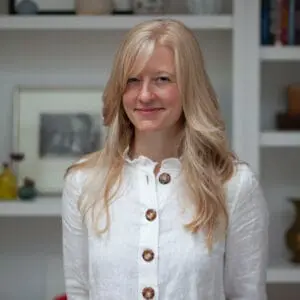The OB fumbles the sonography wand a bit as she hunts for a heartbeat. We’re 14 weeks pregnant. We’ve never made it this far; heartbeats have always stopped by week nine. I’m petrified, braced for the blow of bad news. Did our elaborate science experiment work? Are our embryos viable? After six years, will we finally have a baby? I’m clutching my husband’s now-blue hand.
A fast underwater thump echoes on the doppler. A flicker of light appears on the screen as our baby comes in and out of focus, his heartbeat strong. I shake with tears of disbelief. Hope is a terrifying friend, and I’ve held it at bay for so long. With a sigh, I let it flood my body.
“There’s your little boy!” squeals Sadie. She’s over a thousand miles away in a small midwestern town, carrying the most precious cargo imaginable: our child. In this moment, he feels so close, so remarkably, intimately alive and real. We hold the phone steady as her proud freckled face enters the screen. “Woo-hoo!” she grins. “Okay, I’m gonna get cleaned up, I’ll call you back.”
And just like that, she’s gone.
“It worked, it worked,” I sob into my husband’s shoulder. “Oh my god, it worked!”
Our road to this miraculous moment has been long and arduous. A year earlier, after four pregnancy losses, the last of which had involved weeks of bleeding, I lay on the obstetrics table and wept, hopeless and bereft. The heart of our fifth fetus had stopped, just as the others had.
My trusted doctor had taken both my hands in hers and looked me in the eye with conviction. “We can’t waste any more of your precious embryos,” she’d said. “We need to think outside the box.”
I’d nodded as tears fell in my lap. “Okay, what’s outside the box?”
“Surrogacy. Let’s find someone to carry your baby for you,” she’d answered.


In the culture at large, even in many therapy offices, surrogacy is mostly seen as a business transaction between people who can’t conceive and people who can; some might even reduce it to a risky privilege where ethical boundaries are blurred or crossed. Given my experience, and those of the diverse clients I’ve since worked with who’ve chosen surrogacy to build a family, I think it’s important to address the common misperceptions inherent in these beliefs, especially for therapists, who can play a critical role in helping families through the many emotional challenges that can emerge on this path.
Certainly, for families like mine, the option to attempt surrogacy is a privilege. Although neither my partner nor I are rich, we’re comfortable; and our costs have been offset by the fact that my previous employer offered an IVF benefit, nearly unheard of in our state. Fortunately, more and more employers are offering IVF and surrogacy benefits as part of their medical benefits package, which I believe is progress on an equity front, because the need to access family-planning services disproportionately affects same-sex couples.
Even within the broader privilege of access, anyone who explores surrogacy will have to contend with an ethically tinged question at some point, often posed by well-meaning family and friends: “Why don’t you just adopt?” Does this person really think we haven’t considered adoption already? Do they have any idea how expensive, complicated, and unpredictable that process can be? Are we selfish for wanting a newborn child who’s genetically connected to us? Is our primary responsibility to vulnerable children who need a home, or to the embryos we created while pursuing IVF?
At times, particularly if someone asks us about adoption in a voice that’s aggressive or judgmental, I’ve gotten defensive. Why are those with the ability to conceive naturally so quick to impose a moral obligation to adopt on those who struggle with infertility? Why isn’t adoption a collective ethical responsibility? Now, if anyone were to ask me about adoption, I’d do my best to answer as simply and honestly as I could: “I get why you’d ask that. We chose a different path.”
Grieving Losses
Like me, many people with uteruses who want children grew up assuming they’d carry their own child, so it can require a grieving process to let this dream go. According to Julia Woodward, director of the Psychological Services Program at the Duke University Fertility Center and codirector of their Third-Party Reproduction Program, grieving involves coming to terms with a reproductive story that’s not what you thought it would be. “Some of it simply involves naming the story,” Woodward says. “How did you dream this would go? What parts of it are you grieving? What’s the thing you’ve lost that you were yearning for?”
I’d always dreamed of pregnancy as a time of deep connection to my femininity, and to the incredible poignancy and sacredness of creating life in my body. I’d fantasized about the visceral intimacy I’d have with my child growing inside me. The challenge of birthing excited me, and I’d always loved hearing stories of other women’s strength and endurance as they courageously moved through this astonishing feat.
My husband and I had high fertility prospects based on all observable metrics: good ovarian reserve, low FSH, high AMH, genetically normal embryos, good implantation, heartbeats. Once surrogacy entered the picture, we’d already created embryos at great labor and expense and established that there was some unknowable reason my body couldn’t carry them to term. The theory was that my “uterine environment” was inhospitable for our embryos, but that they’d thrive in someone else’s body. We quickly learned hundreds of surrogacy agencies across the country are servicing a surrogacy market valued at $14 billion in 2022 and expected to reach $129 billion by 2032.
In the first months of researching which agency we should use, we struggled with choosing the right one. The options felt overwhelming. They offered varying types of support alongside the service of matching intended parents (IPs) with surrogates (typically called GCs, or gestational carriers, to distinguish them from traditional carriers, a less frequent type of surrogacy, where the surrogate is biologically connected to the child). These agencies tend to be expensive and have no accreditation or regulatory process for quality control. Initially, these drawbacks intimidated us, and we briefly considered trying to match with a surrogate independently through online forums, Facebook groups, or even through our networks of friends, as dicey as that seemed. But as we looked more deeply into the pros and cons of our options—including altruistic surrogacy, where a surrogate chooses to support IPs without financial compensation—going through an agency with a highly selective screening process felt like the safest and most reliable choice.
We appreciated the fact that in the United States, surrogates accepted by agencies generally have their finances reviewed as part of the approval process and can’t be economically vulnerable or on any government assistance—which helps prevent financial compensation from being coercive. As we narrowed our choice down to a large, national surrogacy agency that had come highly recommended, we felt heartened, as secure about our decision as we could be.
Even so, the further along in the process we got, and the more people I spoke with, the clearer it became to me that oversimplifying the nature of the relationship between surrogates and IPs to focus solely on the financial exchange is narrow-minded, and it may even undermine the surrogacy partnership. “You’re growing life for someone else,” surrogate Kelly Spencer once told me. “It’s not a financial transaction. It’s not like going to the grocery store and swiping a card, and all of a sudden, a baby comes. It’s humans going through an intimate process together.”
“But how could you give up the baby?” surrogates are often asked. Time and again, they answer, “It’s not my baby; it never was.” They often wear clever T-shirts during pregnancy with slogans like “Extreme Babysitting” or “Their Bun, My Oven.” This kind of advocacy is about more than just bringing levity to a complex relationship. It’s important because many IPs will encounter misunderstandings about their connection to the baby over the course of the pregnancy, especially in the hospital delivery room, where nurses may hand the newborn to the surrogate or address her as “mom” throughout the delivery process.
I knew a top priority of mine was finding a steady and psychologically resilient surrogate, since having the capacity to weather the stress of this experience with flexibility seemed essential. I wanted to build a close relationship with her, to feel emotionally connected, and to develop trust. But you can’t manufacture connection, and I worried we might not be able to tap into a mutual sense of care. I took heart in the knowledge that specialized licensed clinicians perform the screening evaluations and assessments of potential surrogates and IPs. These meticulous, high-stakes gatekeeping interviews screen potential surrogates for psychological readiness, build a foundation for the relationship between surrogates and IPs, and help everyone make their values and expectations clear from the start.
I came to understand the importance of this specialized clinical role as I read through Facebook and Reddit IP support groups where IPs occasionally shared nightmarish stories about surrogates doing drugs during pregnancy or refusing recommended medical treatments. To be clear, hundreds of tales of incredible, generous, and loving surrogates far outweighed these occurrences, but it takes only a few horror stories to keep you up at night during a high-stakes process. Careful screening is essential to ensure that all goes well.
The Surrogacy Partnership
Going through this process at the height of the pandemic, when it was risky to travel and interface with medical institutions, meant fewer women were signing up to be surrogates. Also, no one really knew how covid impacted pregnant people’s bodies, so we’d been on a waitlist with our surrogacy agency for eight months when we first met Sadie.
Amanda, our caseworker at the agency, with whom my partner and I had grown close, called one afternoon to say, “I think I found someone for you, but she’s not within your five-hour driving radius. She’s in Iowa. Is that a dealbreaker?”
“Not at all,” I said. “Let’s meet her and see if we’re a good fit.”
When I asked Sadie during our first Zoom call why she wanted to be a surrogate, she burst into tears. She’d dreamed of being a surrogate since high school, loved being pregnant, and was devoted to her daughter. She wanted to help other people have that kind of love, and even evoked a phrase I’d heard many times talking to other surrogates: “It feels like a calling.”
Partnering with a woman from a vastly different cultural background to carry your child is an opportunity for a special type of intimacy, as well as a complex interpersonal dynamic. Women who decide to become surrogates are required by most fertility clinics to have had medically uncomplicated pregnancies, so they often come to surrogacy with positive associations about pregnancy and limited understanding of the traumatic experiences that led many IPs to seek their help. Building a trusting relationship with a surrogate often requires emotional intelligence, the ability to take in the perspectives of others, and the capacity to self-regulate and maintain integrity and compassion during disagreements. These things can be tall orders when you’ve just gotten off a medical rodeo of trauma, loss, and hormone fluctuations. Conversely, so can being pregnant with someone else’s child while raising your own children, working, and maintaining your life.
Having another person carry my baby was a relief and a privilege—and a maddening exercise in loss of control. The most challenging moment of learning to surrender happened at the end of our second trimester, when a new wave of covid hit the Midwest and our doctor recommended that Sadie get the flu and covid vaccines. She refused. I freaked out.
“Help me understand your decision-making here,” I said on a phone call as panic flooded my chest. “What are you afraid might happen if you get the vaccine?”
“Well, what if the vaccine causes me to miscarry and we lose your baby? What if it makes me infertile and I can’t have any more of my own?” Sadie responded.
After a long, shaky exhale, I summoned my softest, most reassuring therapist voice, “Sadie, there’s no research suggesting that’s a side effect of the vaccine, but I appreciate that you want to protect our baby.”
“I know lots of people who died after getting the vaccine, Jennie!” Sadie replied.
Recognizing the rising heat in my torso, the clenching in my gut, and the speed of my thoughts as a mix of anger and fear, I decided to end the call before my reaction came out verbally. Then I went for a long walk in the woods and tried to do a loving-kindness meditation while arguments with Sadie played out in my head. Our baby would be born amid a global pandemic and board a plane when he was three days old, all without crucial immune support to protect him. I felt helpless.
When I got back home, I reread our surrogacy contract, which clearly stated, “Surrogate must follow the medical advice of her doctor.” Sadie was eschewing medical advice. Next, I called our lawyer, who confirmed that we could technically file a lawsuit against our surrogate for breach of contract to compel her to get vaccinated, but she encouraged us to reflect on whether this was worth the cost.
“No, of course it’s not worth it!” I blurted out. Every feminist cell in my body was repulsed by the idea of trying to override Sadie’s bodily autonomy. How could I live with myself if I pressured her to do this against her will? Besides, would it really help my child? We’d be trading immunization for a tidal wave of Sadie’s stress hormones in utero. So I swallowed my pride, bit my tongue, and sent Sadie a bouquet of flowers along with a thank-you card.
When I spoke with Amanda Caroca, a clinical social worker and the director of program coordination for Circle Surrogacy, she said, “The underlying theme in most conflicts I see between IPs and surrogates is control, control, control.” Caroca has spent 11 years working in the surrogacy industry supporting both IPs and surrogates, and she’s seen how many IPs turn to surrogacy with an expectation that they can control the process. “They do get a say in decisions, but they can’t really control the outcome, the biology, or even the relationship with their surrogate.”
Woodward emphasizes the importance of cultivating a partnership between the IP and surrogate. “So much of what makes a surrogate motivated to go through this process is she feels special and generative and wants to experience the IPs’ joy at becoming parents. If there’s a wall between the two sides, then the carrier can feel abandoned,” Woodward says.
Ultimately, I came to imagine that every time I connected with Sadie in a nourishing, positive way, I was caring for my unborn child, too. Finding moments where I could lean into our common love for children and common goal of bringing a healthy baby into the world helped me stay grounded when I felt adrift in worry and disconnected from the pregnancy.
Although our surrogate and medical providers were optimistic from the start about our chances of having a baby, my husband and I lived in dread of losing another pregnancy, even with Sadie as the carrier. As the due date grew nearer, gnawing doubt and dark predictions preoccupied our minds. Then, on a frigid snowy day in Iowa, after three weeks spent biting our nails in a drafty rental apartment a mile from the hospital, we welcomed our baby into our family.
I stood at Sadie’s bedside holding her hand as she made her final push, my husband next to me, Sadie’s husband taking pictures. Our son emerged plump, purple, his face a crumpled confused prune cradled in our doctor’s arms. The umbilical cord was blue, pulsing, otherworldly, beautiful. Immediately, I turned to Sadie and cupped her face in my hands, repeating “thank you, thank you, thank you, thank you” as we both sobbed. It was a moment of deep connection. When the nurse brought him to me and his tiny body yielded to my bare skin, my heart exploded with disbelief and wonder. “I’ll never let go,” I whispered. Though we’d never met before, it felt like a reunion with the dearest, oldest love I’d yearned for with every cell in my body.
ILLUSTRATION © ARTWORK VECTOR
Jennie Dickson-Mills
Jennie Dickson-Mills, LCSW, SEP, ERYT, is a psychotherapist and somatic experiencing practitioner in private practice in North Carolina, a yoga and meditation teacher, and a faculty member for the Mindfulness Institute for Emerging Adulthood. Contact: jennie@jenniedicksonmills.com.












